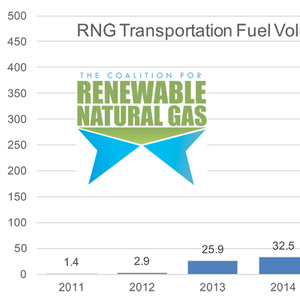California RNG bill could open door to pipeline injection




Coalition for Renewable Natural Gas
May 18, 2016
BY Anna Simet
A proposed bill in California may serve to greatly benefit the state’s renewable natural gas (RNG) industry.
AB 2773 was introduced in February, passed by the Committee on Utilities and Commerce in March and has been referred to the Committee on Appropriations. If it were to become law, it would modify current siloxane requirements and essentially break down the barrier for RNG producers to access the natural gas pipeline.
David Cox, director of the Sacramento, California-based Coalition for Renewable Natural Gas, explained that current laws make it very difficult for developers to do so, and though RNG consumption is rapidly increasing in the state, it is not to the advantage of in-state producers. “In 2015, half of all natural gas vehicle fuel sold in California was renewable natural gas—almost all of it was imported from outside the state,” he said.
Advertisement
The history is as follows. In 2012, AB 1900 overturned the 1988 Hayden Amendment—a law passed pertaining to carcinogen vinyl chloride in pipeline gas but had unintended consequences—and made renewable natural gas injection into California’s natural gas pipelines lawful. “The AB 1900 regulatory process resulted in a final ruling by the Public Utilities Commission, and includes the most stringent gas quality requirements in North America,” Cox said. “Although cumbersome, the majority of the testing protocols and levels are achievable.”
That is, with the exception of the siloxane requirement, which Cox said is “technically infeasible. The RNG Coalition has not found any company that can guarantee their technology can meet the CPUC's siloxane specification.”
If an RNG project does not meet the siloxane spec, but does meet all constituent levels, it’s a no-go for the pipeline.
Another significant barrier has been California’s minimum heating value required for pipeline injection, according to Cox. “California requires a 990-Btu minimum heating value for gas injected into the natural gas pipeline. However, because renewable natural gas does not contain the high-chain hydrocarbons found in fossil natural gas, RNG typically has a 950- to 970-Btu heating value.”
Advertisement
To meet 990 Btu, California RNG projects would have to take on extremely expensive blending protocol, Cox said, either with propane or a secondary fossil natural gas stream.
“RNG projects are not being built in California today because of the siloxane and heating value specifications imposed by the CPUC’s current rule on pipeline injection,” Cox added. “Although we are still hopeful that our recent evidentiary submission to the CPUC will result in a rule modification, Assemblyman Quirk’s AB 2773 would force action by the CPUC, and finally open California’s pipelines to California's renewable natural gas.”
Upcoming Events





